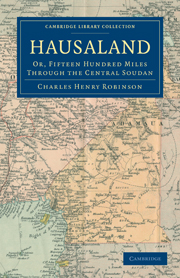
-
Select format
-
- Publisher:
- Cambridge University Press
- Publication date:
- October 2011
- May 2011
- ISBN:
- 9781139034548
- 9781108031240
- Dimensions:
- Weight & Pages:
- Dimensions:
- (216 x 140 mm)
- Weight & Pages:
- 0.47kg, 368 Pages
You may already have access via personal or institutional login- Subjects:
- Area Studies, African Studies, Geography, Historical Geography, History, African History
Book description
Charles Henry Robinson (1861–1925) was a Cambridge scholar who, during the 1890s, published several books on the language, literature and culture of the Hausa people of West Africa. This study, published in 1896, documents his pioneering fieldwork during which, in three months, he travelled 1500 miles across rivers, mountains, villages and towns. Public interest in the Hausa was high at the time, due to their recruitment as troops by Britain in the Ashanti conflict, and by France to consolidate French power in Madagascar. However, Robinson argues against the perception of the Hausa as primarily a warlike people, despite their formidable strength in battle. In this vivid account of his time among them, he portrays the Hausa as successful traders who excelled above all in commercial endeavours. Exploring enterprises from textiles and tobacco to hunting and river transportation, Robinson gives fascinating first-hand insights into this important African community.
Contents
Metrics
Altmetric attention score
Full text views
Full text views help Loading metrics...
Loading metrics...
* Views captured on Cambridge Core between #date#. This data will be updated every 24 hours.
Usage data cannot currently be displayed.
Accessibility standard: Unknown
Why this information is here
This section outlines the accessibility features of this content - including support for screen readers, full keyboard navigation and high-contrast display options. This may not be relevant for you.
Accessibility Information
Accessibility compliance for the PDF of this book is currently unknown and may be updated in the future.

